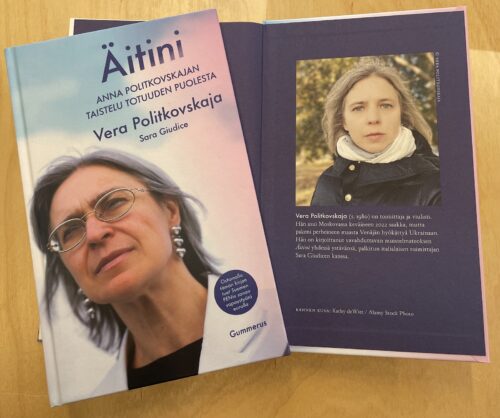The murder of Anna Politkovskaya (30.8.1958 – 7.10.2006) was immediately widely noticed by the media worldwide. The murderer shot Politkovskaya in the lift of her apartment building in broad daylight.
At the time, 7 October 2006, many of those involved with the world’s literary business and many freedom of expression professionals were meeting at the Frankfurt Book Fair, including myself. The shock of Politkovskaya’s murder was considerable. Its cruelty and brazenness signaled that work on human rights and freedom of expression in Russia is extremely dangerous. In Frankfurt, a large and multinational group of us decided that we will not forget: not Politkovskaya or her work, nor the issues she wrote about, the brutality of war, the waste and the injustice.
We grieving Finns regretted most that we had allowed our friend Anna to return to Russia when she had visited us in Finland, as she did a few times each year. We should have hidden her passport or canceled her flight – although it would not have worked, because Politkovskaya, if anyone, would have found a way to go back.
She wanted to live in Russia, she wanted to see her grandchild – whom she never got to meet – and she wanted to work at her beloved Novaya Gazeta paper, where her colleagues were like another family.
Shortly before her death Anna Politkovskaya wanted to consult a friend, a former KGB intelligence officer who had become an expert on Russian politics and a journalist.
“Is my name on a kill list?”, Politkovskaya asked.
“Yes”, the KGB man replied clearly and urged Politkovskaya to immediately leave Russia.
As we know, Politkovskaya did not leave.
And leaving did not save the friend who had advised Politkovskaya and who had left Russia a long time ago: Alexander Litvinenko swallowed polonium just three weeks after Politkovskaya’s death. Andrei Lugovoi and Dmitry Kovtun, agents of the Russian security service, had travelled to London to kill him.
More of Anna Politkovskaya’s friends and colleagues have been murdered since then and many have been jailed.
Russia is waging war in Ukraine, the country of Politkovskaya’s birth.
Politkovskaya’s paper Novaya Gazeta is in exile, because it can no longer write about Russia’s wars. Or about much else really.
The state of freedom of expression in Russia has collapsed.
Fortunately, in the midst of all this misery, there is some good news:
Politkovskaya’s paper, together with some other independent Russian media outlets, can publish abroad, and in the time of digital media, can also reach Russia. The non-violent fight for freedom of expression and democracy in Russia continues, it has just moved underground and above ground, into secret basements and satellites or the web.
Politkovskaya’s dear friend and boss, the founder of Novaja Gazeta, Dmitri Muratov, received the Nobel peace prize in 2021.
And Politkovskaya’s children are well, as is her grand-daughter, Anna.
Iida Simes
Iida Simes is Finnish PEN’s Vice-President and Anna Politkovskaya’s friend.

Gummerus Kustannus lahjoittaa yhden euron jokaisesta myydystä Äitini – Anna Politkovskajan taistelu totuuden puolesta -kirjasta Suomen PENin sananvapaustyöhön.
